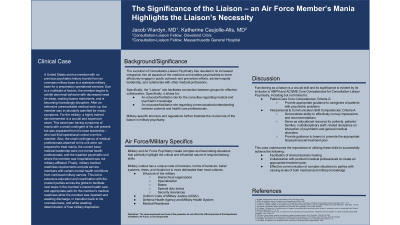Training, Education, Mentorship, and Career Development
(204) The Significance of the Liaison – an Air Force Member’s Mania Highlights the Liaison’s Necessity

.jpg)
Jacob Wardyn, MD (he/him/his)
Psychiatrist
Cleveland Clinic
Cleveland, Ohio.jpg)
Jacob Wardyn, MD (he/him/his)
Psychiatrist
Cleveland Clinic
Cleveland, Ohio- KC
Katherine Caujolle-Alls, M.D.
Psychiatrist
USAF
APO, Armed Forces - AE - KC
Katherine Caujolle-Alls, M.D.
Psychiatrist
USAF
APO, Armed Forces - AE
Presenting Author(s)
Co-Author(s)
Background/Significance: The Liaison work within Consultation-Liaison Psychiatry can be overlooked; however, the evolution of this field has led to it being more integrated into all aspects of the field and enables psychiatrists to more effectively engage in public outreach, prevention efforts, inform hospital leadership, and collaborate with other medical professions. Military Psychiatry creates complex and fascinating situations that highlight the critical and influential nature of psychiatric liaison skills.
Case: A service member from an overseas military base travels to a United States military base for a preparatory operational exercise. Due to a multitude of factors, the member begins to exhibit abnormal behavior with decreased need for sleep, making bizarre statements, and is becoming increasingly disruptive. After an extensive unremarkable medical work-up, the member was involuntarily admitted for manic symptoms. For the military, a highly trained servicemember is a crucial and expensive asset. This asset was having symptoms of mania with a small contingent of his unit present but was separated from his base leadership – who had final operational control over this member. Also, the small contingency of medical professionals attached to his unit were not prepared to treat mania, the current base medical leadership were not mental health professionals, and the inpatient psychiatric unit where the member was hospitalized was not military-affiliated. Finally, military medical readiness requirements exclude service members with certain mental health conditions from continued military service. This led to extensive education and coordination with the prudent parties across the globe to facilitate next steps in the member’s mental health care and appropriate path for the member’s medical readiness while the member was inpatient and awaiting discharge.
Discussion: Functioning as a liaison is a crucial skill and its significance is evident by its inclusion in multiple ABPN and ACGME Core Competencies for Consultation-Liaison Psychiatry. This case underscores the importance of utilizing these skills to successfully achieve the following: facilitating shared decision making, effectively collaborating with pertinent medical professionals to create an appropriate treatment plan, and effectively communicating complex situations to parties with varying levels of both medical (and military) knowledge.
References:
Accreditation Council for Graduate Medical Education. (2022). Supplemental Guide: Consultation-Liaison Psychiatry. https://www.acgme.org/globalassets/pdfs/milestones/consultationliaisonpsychiatrysupplementalguide.pdf
The American Board of Psychiatry and Neurology. (2021). Consultation-Liaison Psychiatry Core Competencies Outline. https://www.abpn.com/wp-content/uploads/2021/11/Consultation-Liaison-Psychiatry-Core-Competencies-Outline-_2021.pdf
H. Leigh and J. Streltzer. (2015). Handbook of Consultation-Liaison Psychiatry – Chapter 2: The Function of Consultation-Liaison Psychiatry. DOI 10.1007/978-3-319-11005-9_2.
Presentation Eligibility: Not previously published or presented
Diversity, Equity, and Inclusion: This presentation will give more insight and cultural competency into the military population and the specific situations that impact military members.

